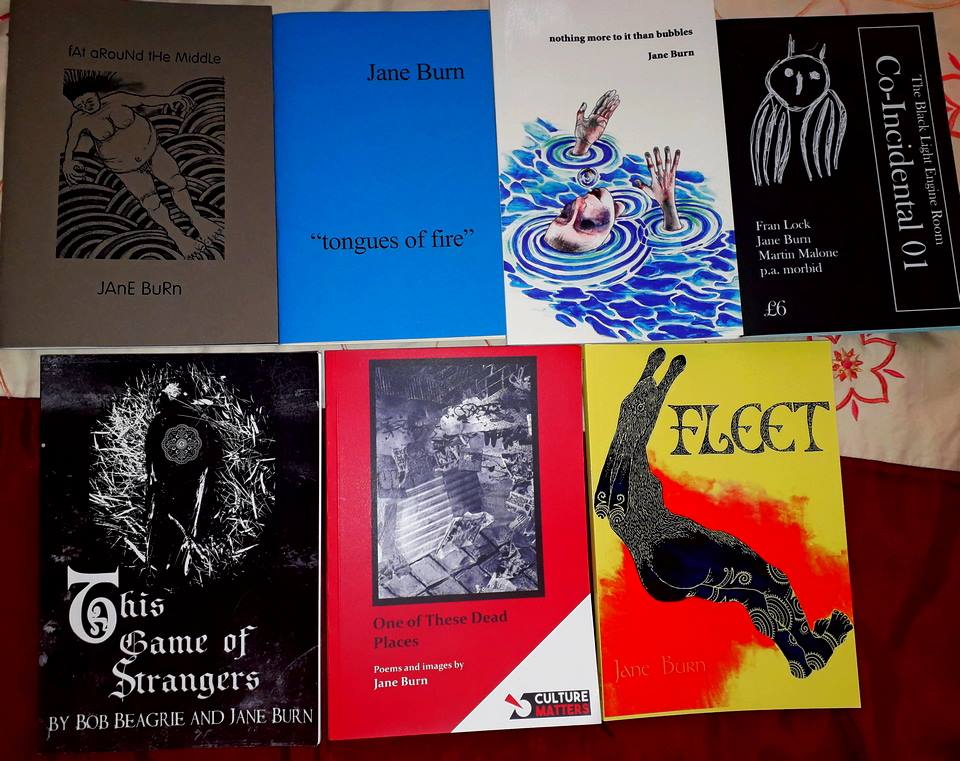
JANE BURN – POETRY AS HARD GRAFT, INSPIRATION, REACTION OR EXPERIMENT?
I interviewed poet & artist Jane Burn who won the Michael Marks Environmental Poet of the Year 2023-24 with A Thousand Miles from the Sea.
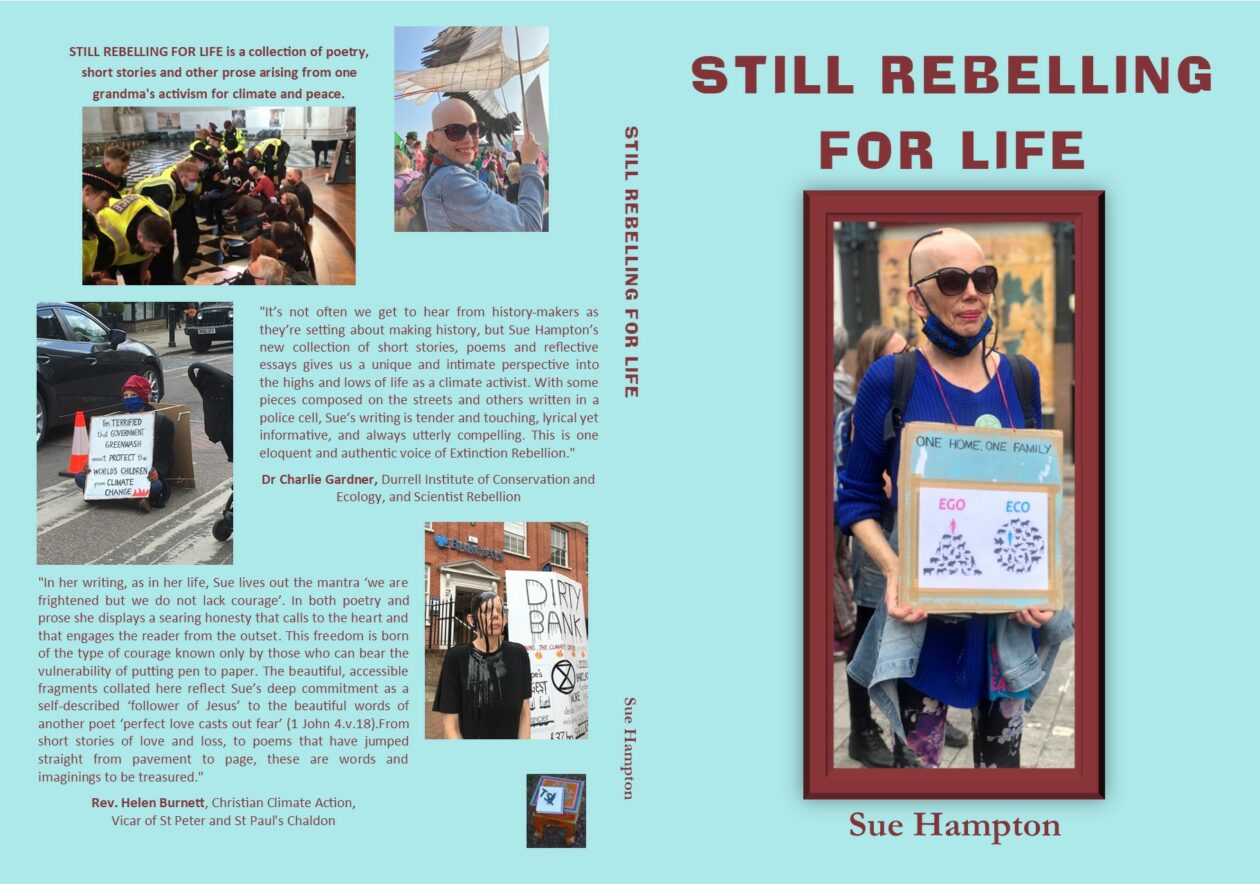
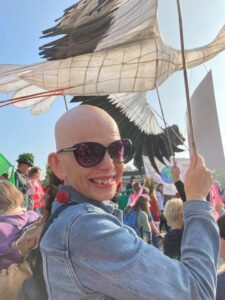
I interviewed Sue Hampton about her latest book Still Rebelling for Life. Sue describes herself on Twitter as: “Quaker, climate & peace activist, grandma, author of 40 titles for kids, teens & adults. BLM, Campaign Against the Arms Trade (CAAT), refugees are welcome. Love wins.”
Leslie: How does this second collection build on or vary from REBELLING FOR LIFE?
Sue: I established the habit of looking back and reflecting on actions, arrests and the courtroom for that first book, but sometimes many months later. Here most of the content is fresh: a natural outcome of something that had just happened. The chronological order is exact, through a mere eight months in 2021, in the shadow of lockdown and with a Home Secretary attempting with progressively totalitarian legislation to criminalise all protest. Given the failure of COP26 with which the book ends, it’s less about the birth and early actions of a new climate movement and more about being at five minutes to midnight.
Leslie: What are the differences in your approach when writing short stories and poetry?
Sue: The poems here are personal. I’m reliving my own experience, usually within a few days. The intention is that by using the first person, and generally the present tense too, I’m drawing the reader into that place and time with all its multi-sensory detail and emotion. The poems are like photographs or paintings, Impressionistic to a degree; the stories are more filmic, with plotlines of sorts. I’m a fast writer and the first draft of a poem adapted from something I’ve lived may emerge within an hour. The emotion is on the surface. With a short story, I have characters to create. Mine are introspective and there’s a little of the imagery found in the poems too, but I’m aiming for living dialogue – and on occasions quote a police officer verbatim! And while there can be no happy endings in a climate crisis, the relationships between characters must carry the stories.
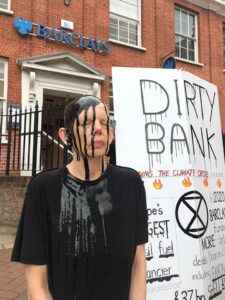
Leslie: What’s the point of exploring and adapting activism experiences in writing after the event?
Sue: After fourteen years of writing fiction across genres I’m now an activist who does exactly that, and only that – partly because I can’t help myself. Writing is what I do best, and has always been who I am and need to be. But the need to take direct action is even more vital for my wellbeing. It prevents my depression, or climate grief, disabling me. So I could call it, like any serious writing, a kind of therapy. After all, there’s something personal as well as universal in any one human’s exploration of humanity. But there’s nothing exceptional about me and many activists will have been there too, and felt the same, so maybe putting this shared experience into words is a way of strengthening bonds, an act of solidarity. I could offer it as a historical record of a time of dramatic urgency, but without swift and radical change there will be no history. More than anything, I hope that like the first collection, this will connect non-activists with the why, how and deep commitment of protest, and challenge readers into their own action. Time is running out. We need millions of people on the streets calling for climate justice and living in its service.
Leslie: How did the characters in these stories come to you?
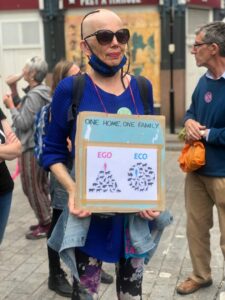
Sue: They’re not constructed in the way I might plan a character for a novel using a kind of spidergram. When I write about Rebels I may be remembering physical details I’ve observed, and I’m aware of some of the difficulties people face, like the tension that arises from living with a partner who doesn’t support activism. Since such partners stay at home, I had nothing to go on when creating Colin in the final story, so he was born for the story rather than developing as a composite figure. But my women friends have provided decades of insight into the female experience from the inside, and of course I use it. It’s true that there are a lot of middle-class, knowledgeable and cultured people in XR, and my stories reflect that. And I’m a follower of Jesus so people of faith, or people who have lost that faith or long to find one, often present themselves to me. But when I begin a story, I’m looking for someone who isn’t me to take my place, to take a direction or view I didn’t take, so it’s a bit like using a wider lens than my own. And that someone walks through the door of my imagination, so I get to know them as I write.

Still Rebelling for Life is available here.
Next week, Amy Bryce talks about how she co-creates immersive effects in music. Amy’s work has been performed at international festivals, on BBC Radio 3, and at Sadlers Wells.
ABOUT LESLIE TATE’S BOOKS:

I interviewed poet & artist Jane Burn who won the Michael Marks Environmental Poet of the Year 2023-24 with A Thousand Miles from the Sea.
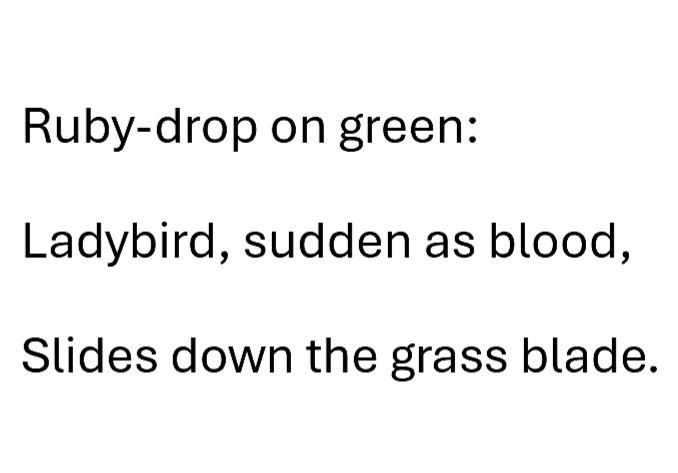
I interviewed ex-broadcaster and poet Polly Oliver about oral and visual poetry, her compositional methods, and learning the Welsh language. Polly says, “I absolutely love
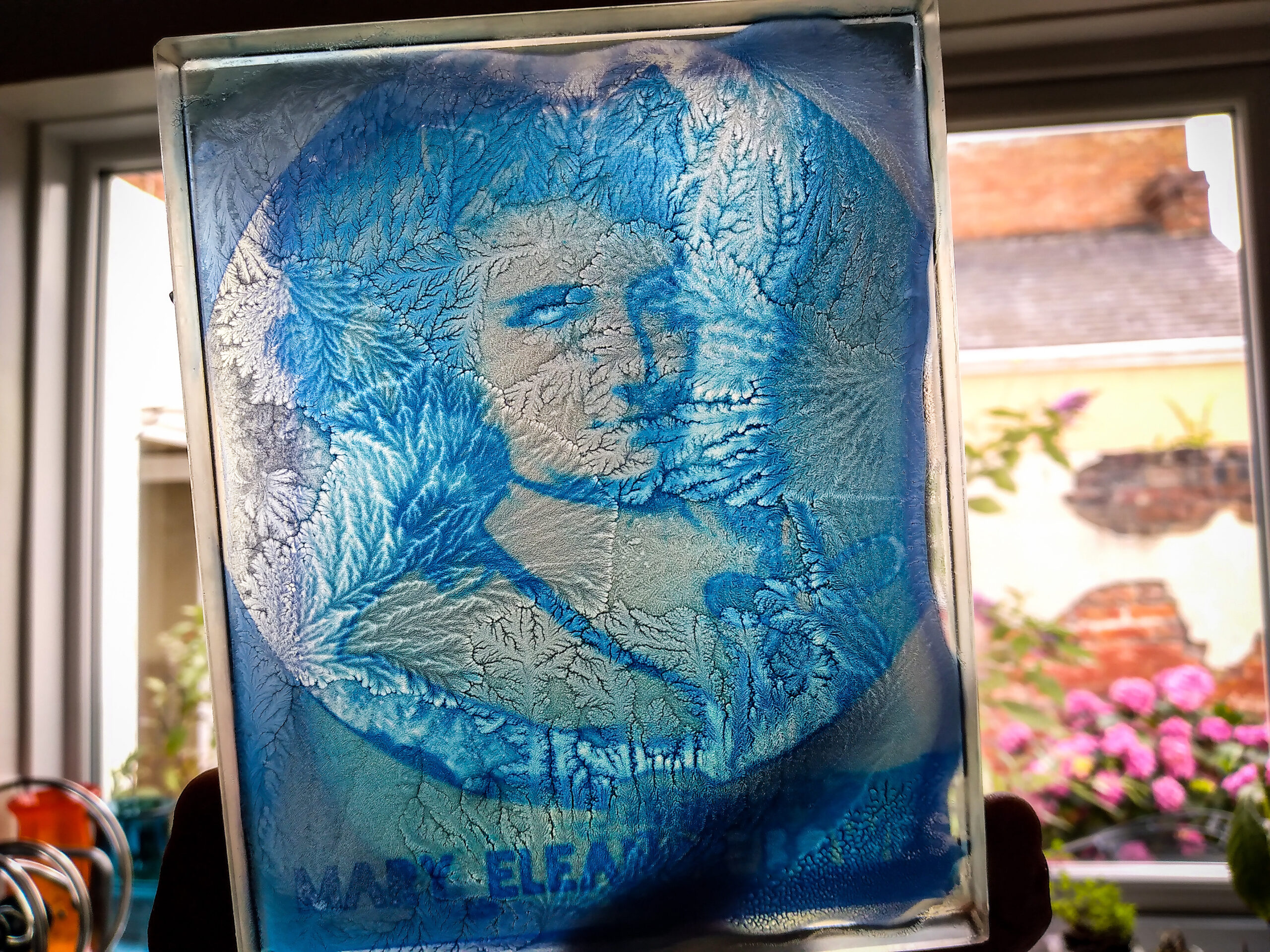
I interviewed Jo Howell who says about herself: “I’ve been a professional photographic artist since I left Uni in 2009. I am a cyanotype specialist.
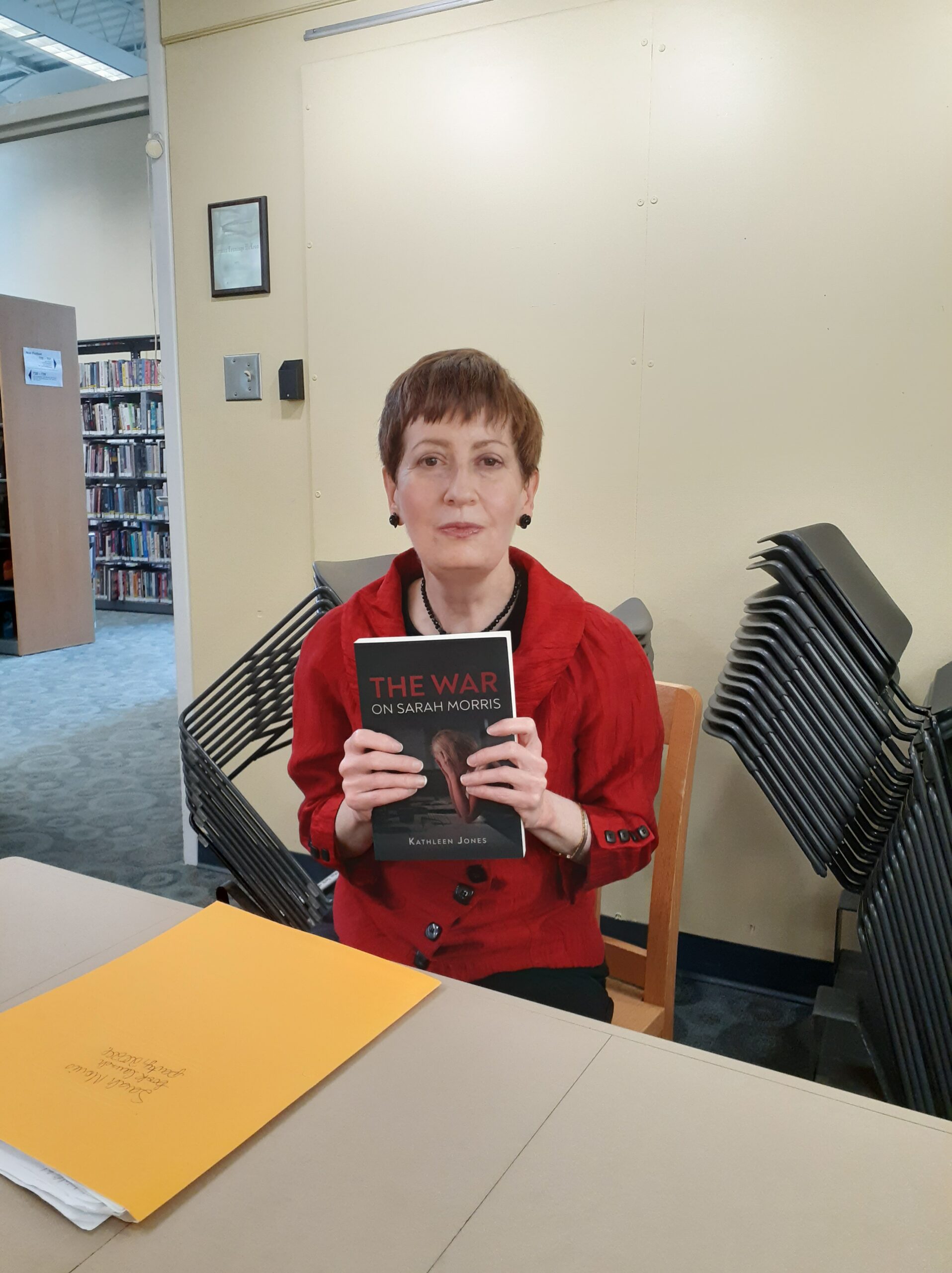
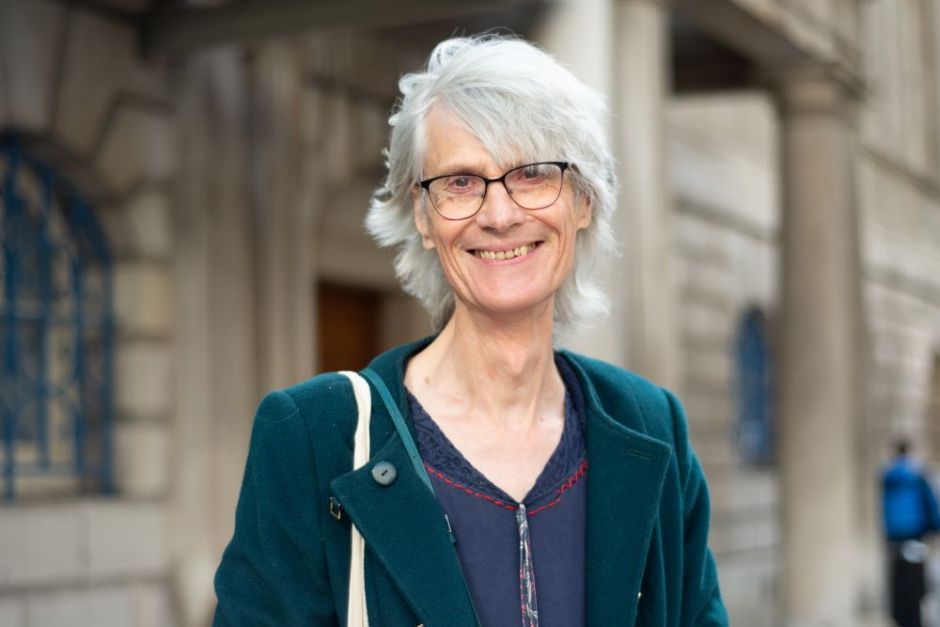
Poet Tracey Rhys, writer of Teaching a Bird to Sing and winner of the Poetry Archive’s video competition reviews Ways To Be Equally Human. Tracey,
| Cookie | Duration | Description |
|---|---|---|
| cookielawinfo-checkbox-analytics | 11 months | This cookie is set by GDPR Cookie Consent plugin. The cookie is used to store the user consent for the cookies in the category "Analytics". |
| cookielawinfo-checkbox-functional | 11 months | The cookie is set by GDPR cookie consent to record the user consent for the cookies in the category "Functional". |
| cookielawinfo-checkbox-necessary | 11 months | This cookie is set by GDPR Cookie Consent plugin. The cookies is used to store the user consent for the cookies in the category "Necessary". |
| cookielawinfo-checkbox-others | 11 months | This cookie is set by GDPR Cookie Consent plugin. The cookie is used to store the user consent for the cookies in the category "Other. |
| cookielawinfo-checkbox-performance | 11 months | This cookie is set by GDPR Cookie Consent plugin. The cookie is used to store the user consent for the cookies in the category "Performance". |
| viewed_cookie_policy | 11 months | The cookie is set by the GDPR Cookie Consent plugin and is used to store whether or not user has consented to the use of cookies. It does not store any personal data. |
2 responses
HI Leslie, this is an excellent interview about Sue’s new book. You are a very brave couple. Kudus to you.
Thank you, Robbie!